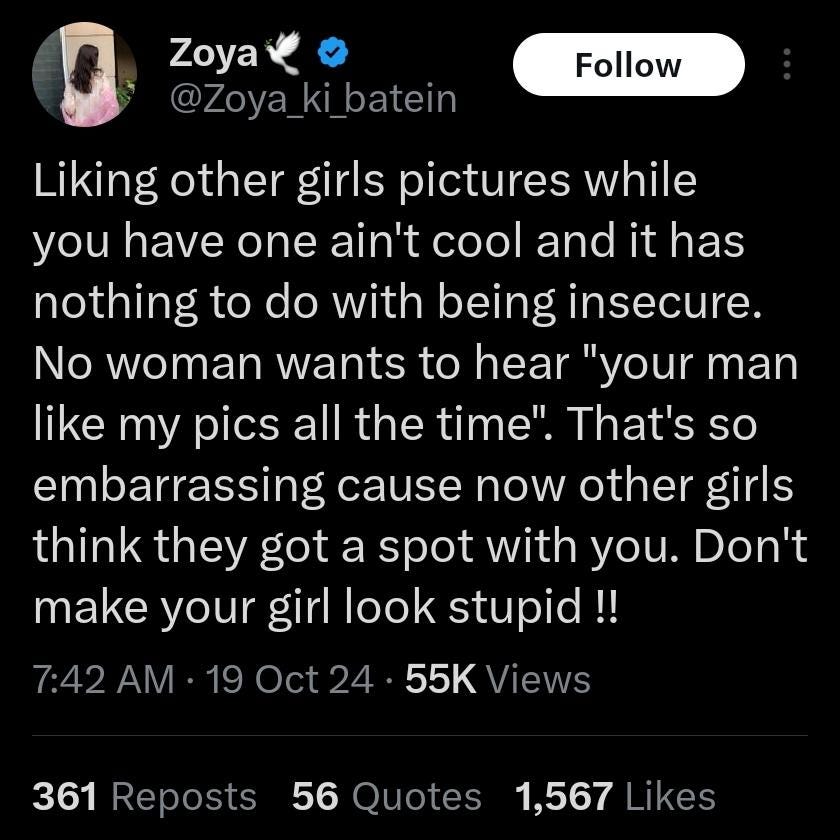Are Social Media "Likes" Really a Big Deal in Relationships?
In today’s hyperconnected world, social media has become a stage for everything, including relationships. From posting photos together to tagging each other in memes, it’s a way couples interact, bond, and sometimes… clash. One of the most common complaints? The dreaded, "Why are you liking someone else's photos?"
But is this concern as simple as it seems? Let’s explore the nuances behind liking photos on social media while in a relationship and why this issue deserves a broader perspective.
1. Men and Social Media Dynamics
First, let’s talk about the stark difference in how men and women experience social media. For most men—unless they’re wealthy, famous, or exceptionally attractive—their online presence doesn’t get nearly as much attention as women’s. Even the most "average" women tend to receive significantly more likes, comments, and engagement on photo-driven platforms than the majority of men.
Why? This disparity is rooted in societal norms. Historically, women’s appearances have been celebrated, often to the exclusion of other qualities, while men’s value has traditionally been tied to traits like status or resources. Although society has evolved in many ways, this imbalance persists in the digital age.
This lack of attention often leads men to engage with others’ photos more often—they’re simply part of a system where their own visibility is minimal. So, when a man likes a photo, it’s worth asking: Is this a simple acknowledgment or something deeper? For most men, it’s probably just the former.
2. Liking Photos vs. Consuming Explicit Content
Here’s another layer to consider: there’s a big difference between liking a photo and engaging with explicit content. Liking a photo is a surface-level interaction. It doesn’t necessarily indicate deep interest or romantic intent. On the other hand, consuming explicit material—like pornography—has far more serious implications for the brain, relationships, and even self-perception.
If liking photos is such a concern, maybe the focus should shift to the culture of hypersexualization online. After all, men often engage with suggestive imagery because that’s what dominates their feeds. Encouraging people—particularly women—to share more modest or thoughtful content could help change this dynamic altogether.
3. Context Matters
Not all likes are created equal. Does liking a picture of a family member, coworker, or friend carry the same weight as liking a bikini photo of a model? Probably not. Context matters. Assuming every like is romantic or sexual in nature can be a leap that often stems from insecurity rather than reality.
For example, liking a vacation photo of a high school friend isn’t necessarily a betrayal—it’s a friendly interaction. Conversely, if someone is consistently engaging with suggestive or flirty content, that’s worth a discussion. But blanket assumptions about all likes being problematic overlook the complexity of human interaction.
4. Insecurity vs. Relationship Norms
For some women, seeing their partner like other women’s photos feels like a betrayal. It can be embarrassing, especially if someone points it out. However, this reaction often reflects insecurity rather than a genuine relationship issue.
Not all relationships are built on the same rules. There are plenty of couples where both partners are open-minded and unbothered by such actions. Instead of projecting a one-size-fits-all rule, the focus should be on clear communication and mutual understanding. If a partner's online interactions make someone uncomfortable, a calm conversation about boundaries can often solve the issue without unnecessary drama.
5. When Women Like Men’s Photos
Interestingly, the dynamic shifts when a woman likes a man’s photo. Because men receive far less attention online, even a simple “like” can carry more weight. A man, unused to such validation, might misinterpret the gesture as romantic interest or a sign of deeper feelings. This happens not because men are inherently clueless, but because their experiences on social media are vastly different.
In contrast, women are accustomed to receiving likes and comments regularly, so they’re less likely to interpret them as meaningful. This asymmetry in online interactions highlights the need for empathy and understanding when navigating these situations in relationships.
The Bigger Picture
So, what’s the takeaway? If the issue lies in liking pictures, it’s essential to evaluate what that behavior represents within the relationship. Blanket statements like “Liking other girls’ pictures is disrespectful” overlook the complexities of individual relationships and the cultural forces at play.
Instead of shaming men for harmless online interactions, it’s worth addressing the root of the discomfort—whether that’s personal insecurity, societal expectations, or lack of communication. Likewise, understanding the broader dynamics of how men and women experience social media can help both partners navigate these situations with empathy and clarity.
Ultimately, the key is communication. Talk to your partner, express your feelings, and find common ground. At the end of the day, a strong relationship is built on trust, not likes.





